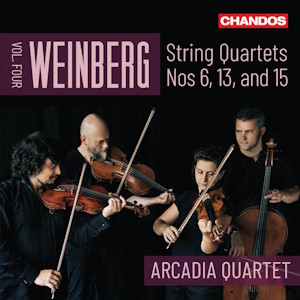
Mieczysław Weinberg (1919-1996)
String Quartets Volume 4
String Quartet No.6 in E minor, Op.35 (1946)
String Quartet No.13, Op.118 (1977)
String Quartet No.15, Op.124 (1979)
Arcadia Quartet
rec. 2023, Potton Hall, Dunwich, Suffolk, UK
Chandos CHAN20281 [75]
Beethoven will always remain the bedrock of what music means to me. Other than that, I had always been sure nobody could supplant Shostakovich as my favourite composer. But my love affair with Weinberg’s music means that he is vying for the top spot.
Weinberg was one of a number of Soviet composers the regime branded ‘formalist’ in the 1940s. His music was deemed complex, experimental and too intellectual, thus difficult for the ordinary worker to understand readily. Never mind how inane that sounds, the tag made Weinberg’s sixth string quartet not recommended for performance. The effect was that he wrote no quartets for over a decade.
Granted, the quartet is full of what then would have been new ideas. As David Fanning writes in the booklet notes (from which I will quote here, with thanks), even Weinberg’s closest friend and mentor Shostakovich had written nothing yet in such advanced musical language. Still, there are easily definable and very melodious tunes in the first movement, and none of the ensuing music is so complex as to be really challenging. The next two movements are both under three minutes, one frenetic, the other mixing agitation with questioning passages.
The fourth movement, by contrast deeply reflective, plumbs rich depths of sentiment. The Moderato commodo fifth movementrecalls previous themes in muted fashion, with the odd attempt at an outburst subdued by otherworldly sounds to conclude. The finale, a review of the main material, tries to resolve what Fanning calls “the Quartet’s various structural and emotional imbalances”, though not without its own contribution to quirkiness: dancing rhythms to puncture the seriousness.
The work was published in 1949 and reprinted thirty years later, but it seems there was no performance in Weinberg’s lifetime. Quator Danel gave a première at the University of Manchester on 25 January 2007, oddly enough six decades after composition. Do read David Fanning’s scholarly notes before you listen. The background and listening hints make the experience all the richer.
String Quartet No.13, Weinberg’s shortest, is the first to avoid character indications. Instead, he used the metronome markings, as he did in further quartets. There is an anguished air to this piece, presented in stark fashion, despite Weinberg’s characteristic lyricism. David Fanning writes that Weinberg re-engaged with Bartók’s quartets. That can be discerned in the more experimental passages. Overall, there is something searching yet unresolved. Perhaps the quartet expresses Weinberg’s feeling of loss after Shostakovich’s death.
Weinberg wrote String Quartet No.15 a mere eight weeks, truly jaw-dropping if one considers its length and ground-breaking complexity. And to think that the sixth quartet was considered formalist… It was always clear what Shostakovich wanted to express in his chamber music. With Weinberg, we have hardly a clue, so are left to judge the work on purely artistic merit. This helps: we need not speculate on hidden meaning, so the music speaks for itself.
The first movement is very slow, the second even slower. Both are gently innocuous, with a tuneful core. The third movement is another nod to Bartók. The fourth is march-like and rhythmic. The fifth takes the mood forward with Weinberg’s attractive stridency, an unlikely yet apt characterisation. This goes on in the sixth and seventh movement, though with softer edges. In the eighth, pizzicato chords make for an enjoyable break in an otherwise rather bleak atmosphere. The concluding ninth movement injects a degree of contemplative sadness; it refuses to resolve all the loose ends, leaving the listener to come to their own conclusions.
As is often the case, repeated hearing will reveal more of the emotional content, and add to an appreciation of what Weinberg was about. The Arcadia Quartet write as a postscript in the notes (I will quote from it again, with thanks): ‘His music is like a glow of light surrounded by the darkness of the unknown…’ The quartet has made it their mission to ‘dilute these shadows’. They further reveal what they characterise as ‘this wide-ranging, profound phenomenon’. They ‘hope that, with time, Mieczysław Weinberg will take his rightful place in the history of music’. One cannot have put it better. It is string quartets like the Arcadia who will make that desire come true. Their integrity appears in every note, and their love and reverence for the music is clear in these stand-out performances.
Steve Arloff
Buying this recording via a link below generates revenue for MWI, which helps the site remain free



















